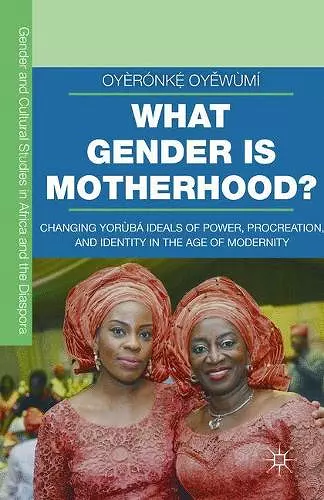What Gender is Motherhood?
Changing Yorùbá Ideals of Power, Procreation, and Identity in the Age of Modernity
Format:Paperback
Publisher:Palgrave Macmillan
Published:9th Dec '15
Should be back in stock very soon
This paperback is available in another edition too:
- Hardback£79.99(9781137538772)

"Oy?wumi continues to proffer formidable power-knowledge moves beyond gendered concepts of 'woman'. She tasks us with radical, matripotent comprehensions of the institutions and practices of Ifa, motherhood, marriage, and family, as charted through Yoruba categories of knowledge. Consequently, Oy?wumi provides considerable contribution to critical feminist and womanist scholarship" - Epifania A. Amoo-Adare, Center for Development Research (ZEF), University of Bonn, Germany "What Gender is Motherhood? is a beginning rather than an ending, as it poses an important challenge to feminist history and theory that projects the world in hegemonic ways. Oy?wumi's contemporary examples of the chilling effect, on scholarship, of widespread acceptance of a natural male-dominated ethos among the Yoruba are disconcerting to say the least. Let's get this book out there and keep the discourse invigorated." - Cheryl Johnson-Odim, Provost Emerita, Professor, History, Dominican University, USA "The central question asked in this book - 'what is the gender of motherhood?' - will set all readers thinking anew about sexuality, reproduction, and natality. Oy?wumi's original thinking about these issues will provoke reconsiderations of many axioms of knowing about the history of genders." - Ade?le?ke? Ade?e??ko??, Humanities Distinguished Professor, The Ohio State University, USA
In this book, Oyěwùmí extends her path-breaking thesis that in Yorùbá society, construction of gender is a colonial development since the culture exhibited no gender divisions in its original form.
In this book, Oyěwùmí extends her path-breaking thesis that in Yorùbá society, construction of gender is a colonial development since the culture exhibited no gender divisions in its original form. Taking seriously indigenous modes and categories of knowledge, she applies her finding of a non-gendered ontology to the social institutions of Ifá, motherhood, marriage, family and naming practices. Oyěwùmí insists that contemporary assertions of male dominance must be understood, in part, as the work of local intellectuals who took marching orders from Euro/American mentors and colleagues. In exposing the depth of the coloniality of power, Oyěwùmí challenges us to look at the worlds we inhabit, anew.
ISBN: 9781349580514
Dimensions: unknown
Weight: unknown
262 pages
1st ed. 2016